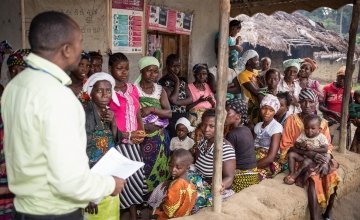
Read our 2023 annual report

Knowledge Hub
COP21: What the Paris climate deal means for the world

The dust has now settled on the COP21 climate talks in Paris, but what do the results mean for those most at risk from the effects of climate change? Ally Carnwath, who was there as the action unfolded, explains.
So after decades of discussion, months of coalition-building, a fortnight of fraught negotiation, and three straight nights of tough diplomatic tussling, things finally came good.
Amid cheers and sighs of relief from exhausted delegates, the Paris Agreement - the first ever truly global treaty to fight climate change - arrived on Saturday afternoon.
But how will the treaty affect people who most need climate justice - those suffering flooding in Bangladesh, or droughts in Chad?
All in: 195 countries sign up
The existence of the Paris Agreement is, in itself, a huge achievement. Never before have we had a universal agreement on climate change that includes all countries.
In 1997 the Kyoto Protocol set targets for emissions cuts. But as not every country ratified the deal, its power was somewhat weakened.
The Copenhagen climate change conference in 2009 was supposed to deliver a treaty but ended in chaos. In Paris, however, 195 countries signed up to the agreement. At last we have a contract between all the countries of the world to drive action. That is no mean feat.
An ambitious deal
Of course a global agreement is not, by itself, enough.
Many people at the conference worried that the final deal would have to be unambitious in order to get countries on board.
Most of us predicted that if an agreement came, it would limit the average global temperature rise between pre-industrial times and the year 2100 to 2 degrees Celsius.
Thankfully the agreed figure is actually lower. It is 1.5 degrees Celsius, a limit demanded by many low-lying states and developing countries.
That 0.5 degree difference may seem small, but it could have a massive impact on the lives of the world’s poorest people. Their countries will require help in adapting to the problems that climate change will bring. So it’s good news that rich nations have agreed to release about $100 billion a year until 2025, and more afterwards, to help these countries become more resilient to the dangers ahead.
Challenges ahead
However, it should be noted that the assurances on finance are not legally binding. Poor people in developing countries will have to rely on rich countries sticking to their word.
Also, the loss and damage principle - the idea that countries already experiencing the impacts of climate change should receive compensation - was one of the most hotly debated issues in Paris with some richer countries dug their heels in to avoid liability.
However the idea is at least mentioned in the Paris agreement, meaning that it lives on, to be wrestled over another day.
Grounds for hope
So what did the talks bring? Some relief and some disappointment. But most of all, solid grounds for hope.
There is much still to be done – and the rate at which countries are currently releasing emissions will make it difficult to restrict warming to 2 degrees Celsius let alone 1.5 degrees Celsius.
However, the Paris deal does mean governments have to check their emission targets every five years.
And this means they’ll face more pressure to reduce warming.
Time to step up
For those already experiencing the impacts of climate change, fast action is needed. If we can hold our leaders to the promises they’ve made on climate finance and push them to make stronger, more ambitious cuts to carbon emissions, our hopes will be justified.
The Paris climate talks will be seen as the moment the world pulled together at last, and stepped up to the challenge of climate change.


